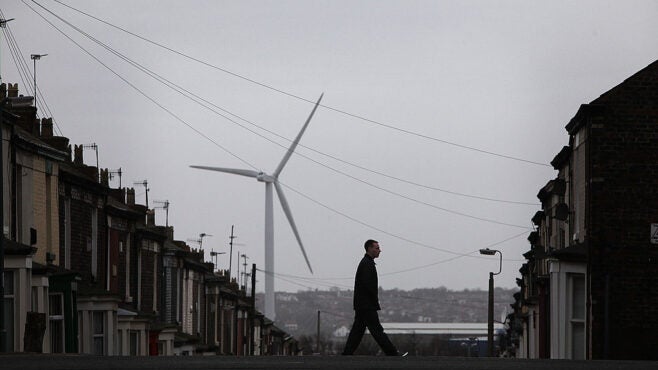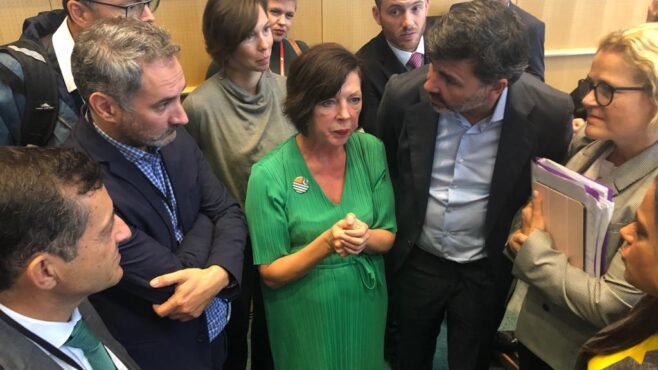When former Member of the European Parliament Theresa Griffin was 14, her dad lost his job as a machinist in a car factory. It was the late 1970s and the UK was in the throes of an economic crisis. Unemployment was rising across the country. Griffin’s dad did not get another job until she was almost 18.
This experience shaped his daughter’s life. While working in the creative sector, she became a city councillor in Liverpool, one of the cities worst affected by the UK’s industrial decline. Once the great port of the British Empire and a vibrant manufacturing centre, things went from bad to worse in the early 1980s as the docks closed and factories shut their doors for the last time. The city experienced some of the highest unemployment rates in the country – during 1972–82, Liverpool lost 80,000 jobs and its manufacturing sector halved.
Griffin worked her way up in the Labour Party and became a regional organiser for Unison, a public sector trade union. In 2014, she was elected MEP for the north-west of England, focusing immediately on issues related to energy and people until, like all UK MEPs, Brexit forced her to step down.
Unable to continue her work through Brussels’ political channels, Griffin became a senior associate at climate think tank E3G in January 2021. She will support its clean economy team on the social dimensions of the European Green Deal, in particular the just transition, energy poverty, citizens’ and workers’ rights, and consumer protection.

In a world facing climate change, coronavirus and an economic nosedive, the notion of a “just transition” may seem like a bonus rather than a must-have, an added benefit from moving away from fossil fuels and building back better after the pandemic. However, as Griffin makes clear, the transformation to a net-zero economy, as is now the goal of many businesses and all major economies, will not happen unless everyone feels part of it.
Energy is a basic social right
“We need to engage people,” Griffin says, speaking to Energy Monitor from her home in Liverpool, where she has been self-isolating as severe rheumatoid arthritis puts her on the coronavirus at-risk list. “We are not just talking about reaching parliament or trade unions, but how we engage everyone. This is not an ‘either or’. When we come out of the pandemic, we need clean, green jobs and a unified approach to industrial policy across all government departments.”
Focusing on the existing workforce is important, but Griffin also wants attention directed at young people, including those still playing shop. “We need to be looking to the future and how we build it,” she says. “We need to be thinking about the creative education of three-year-old girls now.”

The energy transition is much more than an opportunity to slash greenhouse gas emissions, it is a chance to reset the economy, end energy poverty and increase equality.
Griffin first became fully aware of the impact of energy poverty as a councillor in Liverpool. “I used to hold my surgery just after 4pm so women could come in on their way back from school. They would tell me about not having enough money to put in the electricity meter. Energy is not a commodity, it is a basic social right.”
“Nobody should have to choose between heating, cooling or eating. Everybody should earn enough money to be able to put enough food in their shopping trolley and not worry about paying for it. There is nothing worse than poverty.”
Climate action and digitalisation
For Griffin, “affordability and the ability to choose” are as central to climate action as renewables. “People should not have to make the choice between switching on the lights or buying a gift or having access to broadband,” she says. Such choices and societal inequalities have come to the fore during the pandemic with many parents forced to homeschool several kids around a single smartphone without a decent internet connection. “We have to tackle the climate emergency and digitalisation together,” says Griffin, insisting both are vital for a successful, and socially just, energy transition.
She believes the press has a vital role to play in bringing together these different threads in the minds of the public, politicians and business. “I started with an arts background,” she says. “Narration and journalism are crucial to telling the story of a good society.” For her this means a future where energy is clean, modern businesses thrive and society is more equal.
Having also grown up in the north-west of England, this is a vision that makes total sense to me. As Griffin’s dad was losing his job, I was taking my first steps in a landscape littered by hundreds of mainly empty factories, a testament to the spectacular rise and fall of the cotton industry in and around Oldham, once the cotton-spinning centre of the world. The last cotton wasn’t spun in the town until 1998, but the rot set in 30 years earlier when production moved overseas, leading to the demise of local engineering companies. The town’s coal production had ended many years before.
The Oldham I knew as a child was poor and troubled with high rates of long-term unemployment. Long after I left, in 2001, the city experienced the worst racially motivated riots in the UK for 15 years, resulting in community relations improvements and regeneration schemes. Poverty and a lack of jobs doubtless played a role in these events.
Upfront intervention
Every government and company in the world is aware of climate change and the need to change the way we power our economy. By choosing now to put the just transition, jobs and equality at the heart of the move to net zero, policymakers and businesses can achieve much more than climate action.
“In the past, we intervened when industries had already declined,” says Griffin. “This time we need to intervene up front, reskilling and upskilling workers for the industries of the future.” A good example of this in practice is the decision last month – after pressure from trade unions – of UK car manufacturer Rolls-Royce to keep its factory open in Barnoldswick, she says. Instead of laying off workers, the company announced it was creating a “centre of excellence” that would “include programmes designed to help meet the challenge of climate change”.
“If one industry goes, local shops go, local schools go, the local economy goes,” says Griffin, talking from her personal experience as a child. “People said Liverpool would go into terminal economic decline, but instead we applied for EU funding, became the European Capital of Culture in 2008 and re-established ourselves on the international stage.”



